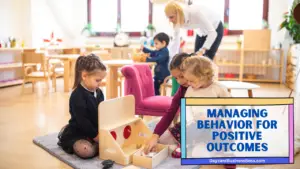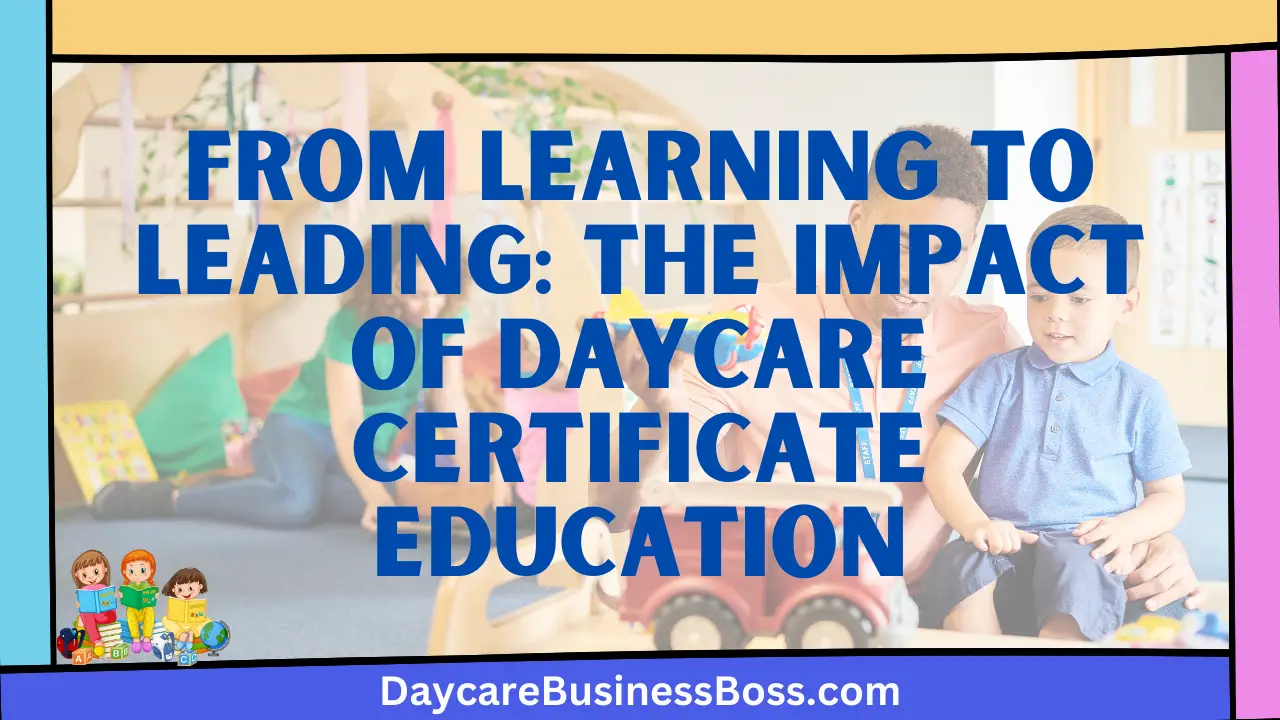The field of childcare is one of enormous responsibilities since the gentle care and instruction of young brains shape the future. Daycare providers play a critical role in promoting children’s holistic development and safety during their early years. The need for specialist knowledge cannot be stressed in this complicated world, where dedication meets gentle caring. Daycare certificate courses serve as beacons of professional development, providing a path to excellence for professionals dedicated to improving the lives of the children in their care.
The best way to enhance daycare skills is to pursue courses like Early Childhood Education, Child Development, CPR and First Aid, Behavior Management, and Health & Safety. These courses provide vital knowledge and expertise essential for ensuring the well-being and development of young children in a daycare setting.
The Significance of Early Childhood Education

Early Childhood Education (ECE) is a critical component of every competent daycare professional’s repertoire of abilities. This introductory course explores the complex geography of theories and practices, revealing the art of educating young children. Its focus extends beyond simple instruction to developing cognitive, emotional, and social components of development in children’s young minds.
Individuals who delve into the depths of ECE are steeped in a rich tapestry of knowledge that equips them with the tools to mold young minds. Understanding the subtleties of age-appropriate learning approaches is one of its most important aspects. ECE enables daycare staff to adjust their teaching approaches by understanding the delicate dance between a child’s age and cognitive capacity. This guarantees that learning experiences are not only understandable but also engaging, cultivating a passion for knowledge from the start.
ECE reveals the complex process of curriculum planning, converting it from a routine activity to a strategic masterpiece. Daycare professionals will get insights into building a curriculum that effortlessly integrates critical subjects with play-based learning through this training. This delicate balance guarantees that youngsters receive a comprehensive educational experience that combines formal teaching with the delights of exploration.
The environment is analogous to a painter’s canvas in the realm of ECE. It highlights the critical role of the environment in determining a child’s development. Professionals who have worked in the field of early childhood education recognize that the physical environment is more than simply walls and toys; it is an opportunity to create an atmosphere that encourages curiosity and creativity. They establish the groundwork for an enriching environment that stimulates a child’s imagination by using colors, textures, and interactive features.
At its core, early childhood education (ECE) holds the key to molding not only early childhood experiences but also the trajectory of an individual’s lifelong educational path. Daycare personnel equipped with ECE principles serve as architects of a loving environment in which learning extends beyond the pages of a book and into the recesses of a child’s mind. These experts, through their understanding of ECE, provide conduits for young learners to start on a journey of discovery, self-realization, and intellectual growth.
Read more about: From Chaos to Clean: The Magic of the Free Printable Daycare Cleaning Checklist
Understanding Child Development
Child Development develops as a vital and required course for daycare professionals, revealing the intricate tapestry of growth and progression that children weave during their formative years. This course serves as a lighthouse, illuminating the phases of development that youngsters go through on their way to becoming well-rounded persons. Child Development provides daycare personnel with a vital compass to navigate the complex world of child rearing by delving into the depths of physical, cognitive, emotional, and social development.
Physical transformation is a foundational pillar in the field of Child Development. This course follows a child’s physical development from infancy’s hesitant first steps to the joyful vitality of toddlerhood and beyond. It explains the wonders of motor skill development as well as the enthralling process of sensory discovery. With this comprehensive insight, daycare workers can design activities that nourish children’s developing physical abilities, ensuring that each playtime moment becomes a stepping stone toward physical prowess.
Cognitive development, another area revealed by Child Development, is inextricably linked to physical growth. This aspect reveals the complicated tapestry of a child’s intellectual development, from intriguing glimmers of early investigation to sophisticated problem-solving prowess in later years. This information enables childcare providers to create an atmosphere rich in stimuli that not only satisfies a child’s natural curiosity but also stimulates mental faculties, developing a thirst for learning that lasts far beyond the classroom.
Child Development’s emotional and social elements are equally important. This training introduces childcare providers to the emotional rollercoaster that children experience as they grapple with their feelings, comprehend empathy, and develop a sense of self. It provides insights into the delicate dance of social interaction, encouraging professionals to promote an inclusive environment where friendships are cultivated and disputes are used to progress.
Child Development insights do more than teach; they transform daycare personnel into architects of developmental growth. Daycare workers become nurturing mentors on the journey of self-discovery by adapting interactions, activities, and play to the specific developmental needs of each child. Armed with this information, they create an environment in which children not only thrive, but also grow into individuals full of confidence, curiosity, and a desire to learn.
Ensuring Safety with CPR and First Aid Training
Children’s safety within the protective cocoon of a daycare setting is an unshakable priority, a responsibility that necessitates vigilant preparedness in the event of unanticipated catastrophes. In this world of constant vigilance, learning CPR and First Aid is not an option, but a requirement. These abilities serve as the armor that enables childcare providers to navigate the turbulent seas of critical circumstances with speed and efficacy, protecting the safety of young lives.
CPR and First Aid training is more than just education; it transforms into a toolbox of life-saving procedures adapted to the delicate requirements of newborns and young children. A cornerstone of this training is cardiopulmonary resuscitation (CPR), which becomes an emblem of hope in the face of cardiac distress. It converts daycare workers into first responders, with their hands moving in unison to reignite the vital power within a young heart. With each compression, they close the gap between despair and possibility, reviving the weak.
Another cornerstone of this training is choking interventions, which become a beacon of hope in times of danger. When a child’s airway gets obstructed, daycare personnel equipped with this skill set become the firm anchors of rescue. They clear the impediment with precise movements, reopening the floodgates of breath. In these pivotal times, the value of their training transcends theoretical assumptions, highlighting the actual impact they may have on a child’s life.
This comprehensive training concludes with basic first aid methods, imprinting on daycare caregivers the capacity to treat a range of unexpected scenarios. From tiny scrapes to major traumas, these abilities enable experts to stop bleeding, stabilize fractures, and offer rapid treatment until medical help arrives. With each bandage placed and wound cared for, childcare caregivers serve as a link between trauma and recovery, providing peace to both the kid and their concerned guardians.
Mastery of CPR and First Aid is more than just a set of skills in the realm of childcare. It demonstrates the dedication of daycare providers to the well-being of the children under their care. In an emergency, their training changes them from caretakers to life guardians, serving as the first line of defense against uncertainty. Daycare personnel becomes the safety net that guarantees children are sheltered from harm’s way by donning the mantle of CPR and First Aid expertise, exhibiting their unwavering dedication to the sanctity of young lives.
Managing Behavior for Positive Outcomes

Behavior Management emerges as an essential cornerstone within the complicated fabric of daycare abilities, an elegant blend of guidance and understanding that transforms the frequently chaotic arena of child interactions into a harmonic symphony. Daycare professionals, like experienced conductors, must employ adaptive tactics to foster positive behaviors and establish a supportive environment in which children can thrive.
The Behavior Management course reveals a variety of approaches that go beyond traditional training in this complicated ballet of young brains. It is not only a matter of regulating behavior, but of shaping the very nature of interactions and behaviors that young children exhibit. At its heart is the art of dealing with difficult behaviors with empathy and efficacy. Whether tantrums, resistance, or other irritating behaviors emerge, this training equips daycare staff with the tools to analyze the underlying causes and divert them to more constructive paths.
Another critical aspect revealed by this course is the formation of routines. Routines, like the constant rhythm of a melody, give youngsters a sense of predictability and security. They provide a road plan for the day’s activities, seamlessly transitioning students from one to the next. Professionals provide children with a soothing structure that promotes their sense of security and confidence by weaving these routines into the fabric of the daycare experience.
The design of a structured environment emerges as an artistic skill that daycare professionals learn in this course. This environment serves as the stage for the complicated dance of cooperation and respect. Professionals assist the development of social skills and pleasant connections by arranging physical space and devising activities that stimulate collaborative play. The environment itself becomes a silent teacher, encouraging youngsters toward ideals such as sharing, empathy, and good communication.
When childcare providers use these tactics, they create a harmonious environment in which children can thrive. The peaceful environment extends beyond the physical domain; it intertwines with the emotional landscape of children, fostering a sense of security and belonging. Positive behaviors arise as a result of the trust fostered between daycare staff and children, resulting in a symbiotic relationship that pushes growth.
Read more about: Daycare Evaluation 101: What to Include in Your Checklist
Prioritizing Health & Safety
The imperatives of Health and Safety stand as unshakable sentinels in the realm of a daycare environment, guarding against the specter of accidents and illnesses that can throw a shadow over the dazzling world of childhood. The safety of children in the care of childcare workers is a sacred trust, and it is this trust that drives the importance of Health and Safety training. Professionals who complete this course embark on a voyage of enlightenment, immersing themselves in a treasure mine of information that extends beyond the confines of simple childcare to include the preservation of life and vitality.
At the heart of this course is a thorough understanding of sanitary practices, which serves as the basis for building the superstructure of children’s health. Daycare providers understand the alchemy of cleaning, making their facilities into hygienic havens. Professionals prevent the transmission of germs and harmful agents that can jeopardize the delicate balance of children’s health by mastering the art of thorough cleaning and disinfection. Surfaces sparkle in this cleansed paradise, play spaces become portals of investigation rather than sources of contamination, and youngsters run around in an environment that exudes health and well-being.
The training navigates the complex maze of nutrition rules, equipping daycare staff with the knowledge to create menus that nourish both the body and the mind. Armed with this knowledge, providers create meals that complement the symphony of vitamins, minerals, and nutrients that strengthen children’s developing bodies. The dining table becomes a mosaic of hues and flavors, with each mouthful acting as a brushstroke on the canvas of growth.
Immunization requirements emerge as an important aspect of this course. In an era marked by the return of preventable diseases, daycare providers take on the role of health torchbearers by ensuring that children are sufficiently protected. They protect young lives from the plague of diseases that can impede growth and imperil well-being by understanding and adhering to immunization schedules.
The Health and Safety course culminates in the creation of a child-proof environment. Daycare providers, like artists of safety, methodically examine environments and design arrangements that connect with the spirit of protection. Furniture is secured, risks are removed, and corners are smoothed, changing the area into a haven for youngsters to explore and learn.
Frequently Asked Questions

Why should daycare workers study Early Childhood Education and Child Development?
Early Childhood Education and Child Development courses provide critical insights into children’s cognitive, emotional, and social development. These courses offer ideas for age-appropriate teaching, establishing a stimulating environment that aids in the entire development of children. Daycare professionals who master these concepts can create effective learning experiences that lay a solid basis for a child’s lifelong learning path.
How do CPR and First Aid classes help daycare providers?
CPR and First Aid training are essential for daycare staff to safeguard the safety of children in situations. These courses teach newborn and young child-specific life-saving procedures such as cardiopulmonary resuscitation and how to respond to choking episodes. By learning these abilities, childcare providers can respond to urgent situations quickly and efficiently, potentially saving lives and reducing dangers in their care environment.
What benefits do Behavior Management and Health & Safety courses provide daycare professionals?
Behavior Management courses teach daycare providers how to promote positive behaviors and provide an organized atmosphere. These abilities improve the general atmosphere of the daycare by encouraging cooperative and courteous relationships between youngsters. Health and safety classes emphasize the need of keeping a clean and secure environment, addressing themes such as sanitation, nutrition, and child-proofing. These abilities are critical for preventing accidents and diseases, as well as guaranteeing the well-being of the children in their care.
To learn more on how to start your own daycare checkout my startup documents here.
The information provided by DaycareBusinessBoss.com (“The Site”) is for general informational purposes only. All information on the Site is provided in good faith, however, we make no representation or warranty of any kind, express or implied, regarding the accuracy, adequacy, validity, reliability, availability or completeness of any information on the Site. Under no circumstance shall we have any liability to you for any loss or damage of any kind incurred as a result of the use of the Site or Reliance on any information provided on the Site. Your use of the Site and your reliance on any information on the Site is solely at your own risk.
This blog post is for educational purposes only and does not constitute legal advice. Please consult a legal expert to address your specific needs. Terms and Conditions. (https://daycarebusinessboss.com/terms-conditions/)

Meet Shawn Chun: Entrepreneur and Childcare Business Fan.
I’m a happy individual who happens to be an entrepreneur. I have owned several types of businesses in my life from a coffee shop to an import and export business to an online review business plus a few more and now I create online daycare business resources for those interested in starting new ventures. It’s demanding work but I love it. I do it for those passionate about their business and their goals. That’s why when I meet a childcare business owner, I see myself. I know how hard the struggle is to retain clients, find good employees and keep the business growing all while trying to stay competitive.
That’s why I created Daycare Business Boss: I want to help childcare business owners like you build a thriving business that brings you endless joy and supports your ideal lifestyle.


